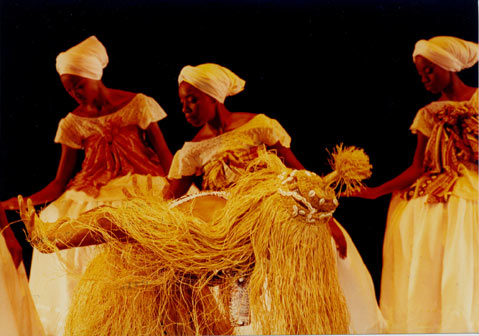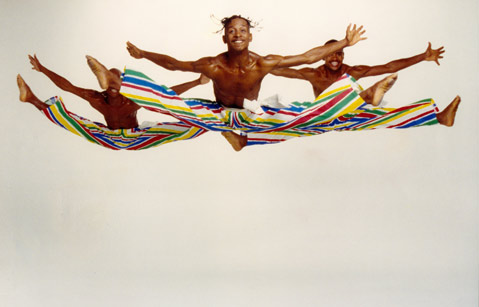Balé Folclórico da Bahia to Visit S.B. March 10
Vibrant Dances and Music from Northeastern Brazil

“The last time I really slept was November 2009,” Walson Botelho admits cheerfully. It’s 10 p.m., and he’s sitting in his Bakersfield hotel room after a day on the road with his Brazilian dance company. I ask him how he keeps up with such a demanding schedule. “We’ve been doing this for 23 years,” he explains. “I’m used to it. I love what I do.”
Botelho is the general director of Balé Folclórico da Bahia, a company he founded in 1988 in order to preserve and transmit the vibrant folk dances and music of his region. They’re based in the city of Salvador, Botelho’s hometown and the capital of the state of Bahia, located on the northeast coast of Brazil. Thanks to its laid-back lifestyle and colorful carnivals, Salvador is known as Brazil’s “capital of happiness.” This Thursday, March 10, Balé Folclórico da Bahia brings a taste of Bahian culture to UCSB’s Campbell Hall.
Today, approximately 80 percent of Bahia’s 15 million inhabitants are of African descent, a legacy that dates back to the beginning of the 16th century, when the Portuguese colonized the region, bringing African slaves with them. From samba dancing to the national martial art of capoeira, many Brazilian art forms have their roots in African dance, and nowhere does the legacy of Africa remain as strong as in Bahia. As a child, Botelho had little interest in his African roots. He studied ballet, and only discovered folkloric dance when he attended a performance in his teens. Fascinated by the Afro-Brazilian art forms, he went on to study cultural anthropology, then to perform and tour with the folkloric dance company Viva Bahia.
Today, Botelho manages his own company of 38 dancers and musicians, traveling internationally to share Bahian culture with the world. In the 16 months since he last got a good night’s sleep, the company has completed three tours of Europe and three of Africa. They performed for the opening ceremonies of the 2010 FIFA World Cup and took part in the World Festival of Black Arts and Cultures in Senegal. It’s an incredibly demanding schedule, but Botelho is driven as a director. His mission, he says, is to show the world “the real roots of Brazil—to share the deep culture in the most pure way.”

He also wants to give audiences a sample of the energy and joy that characterize his region. As a director of a folkloric dance company, he finds the challenge is in balancing authenticity and modern production values. “We’re very different from a contemporary dance or a ballet company,” Botelho explained. “They can create their own dream. We have to be based in the truth, the history, the culture of Bahia. So we always start with research. Many of these art forms have disappeared, so we go interview people who are descendents of slaves, and try to figure out how their great, great grandparents used to do a certain kind of dance or sing a certain kind of song.”
In Botelho’s estimation, Balé Folclórico da Bahia keeps the artistic traditions in the purest form possible, but executes them in a highly professional way. He was proud to report that while on tour in Africa, he woke at sunrise and looked out of his hotel room to see fishermen on the beach performing a ritual before setting out for the day’s catch. Their movements were very similar to those in his “Fishermen Dance,” which the company will perform on Thursday.
Also on the program are “Capoeira,” which highlights the explosive movement and music of that form, and “Samba de Roda,” a dance based on the earliest forms of Brazilian samba. The name of the program is Sacred Heritage, and Botelho sees the show as a sample of the legacy left by Brazil’s African slaves. “This is the heritage they left us,” he said, “and it’s sacred because it’s the soul of the Brazilian people.”
4•1•1
Balé Folclórico da Bahia will perform at UCSB’s Campbell Hall on Thursday, March 10, at 8 p.m. For tickets, call 893-3535 or visit artsandlectures.sa.ucsb.edu.



